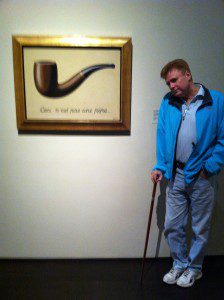Here is an obvious, and uncomfortable, fact: the New Testament writers were as likely to break fellowship over bad behavior as false teaching.

Right teaching was never isolated from holy living: each witnessed to the other. We need not confuse terms and call a wicked Christian a “heretic.” The attempt to justify sin often leads to bad theology about the great truths of the Faith, but need not. A man may confess the Creed while denying the right practice of the Christian by his actions. The slaver may have been orthodox in his confession of Faith, but his actions were damnable.
The Inquisitor did bad things in the name of orthodoxy and damned his soul by it. Even devils believe and tremble, but devils they are still.
And so we come to the most recent American obsession: identifying ourselves based on our attractions. Instead of overcoming the flesh, we are to define ourselves by the desires of the flesh. We also must ignore the reality of nature and refuse the essential (and natural) category of “male” and “female” to define both our sex and our gender.
Much as we might wish it were different, the writers of the New Testament, those that knew Jesus best, were not “sex positive” and the entirety of the historic Church (Catholic, Orthodox, and Protestant) united in the idea that erotic sins were particularly pernicious to the soul. The church rejected calling sexual relations in marriage a sin, but knew that even in marriage sex was a dangerous temptation to the believer.
The thrust of Biblical history is chastity and moderation for every person in every state. Saint John in the Bible ends with the prayers of virginal men crying out to God. In Paradise we will be as the angels, neither married nor given in marriage. The person arguing that sin is not sin is not a good Christian, though he or she might have other “right beliefs.” This is true of those with a light view of sex before marriage, easy divorce, or other acts God condemns for our good.
At this point, the truly shallow thinker points out that American Christians justified slavery or other social ills using “tradition” or Scripture. Of course, this is true and exactly why one should never cut off one’s moral beliefs from the universal church of all ages and nations. Race based slavery was not justified by most Christians in most places at most times. American Christians constantly take American moral aberrations and justify them with Scripture. Such people cut themselves off from the church universal for a little ghetto of contemporary opinion.
One might wonder if “having the right feelings” is not also good and so it is. We need right actions, ideas, and feelings. Sadly, feelings are generally the last to follow the good, the truth, and the beautiful. We should feel love toward our enemies, but it is hard to do so. We must act as if we love our enemies even when we do not. Our actions anticipate our feelings.
We should always be honest about our feelings. If I don’t love my enemy, I should tell my pastor or mentor. We should hide nothing from ourselves or God. I do not wish to be obedient to the rules of God. . . and I should tell Him so! He knows in any case! My feelings must wait, often do wait, on reality. I act, believe, and wait.
Every generation faces some old sin that is proclaimed a new good inside and outside the church. To this constant complaint, the church offers grace, healing, hope, and a chance for repentance. Mostly sinful desires do not vanish this side of Paradise and so we work out our salvation with fear and trembling as a community. We do not judge the individual’s progress if progress he wishes to make nor do we replace the judgments of God on sin with our own opinions. We are not allowed to call the holy profane or the profane holy.
Christians have no trouble working with sinners who are outside the Faith. What do we expect of them? For the person who claims to be Christian but condones sin, our response must be: repent, struggle with us, and find grace otherwise we must break Christian fellowship.
This is what we say to ourselves and what we must say to others. We come as we are to become different than we are. We dare not demand perfection but we cannot condone what God damns.
I pray always: “Lord Jesus Christ, son of God, have mercy on me a sinner.”











